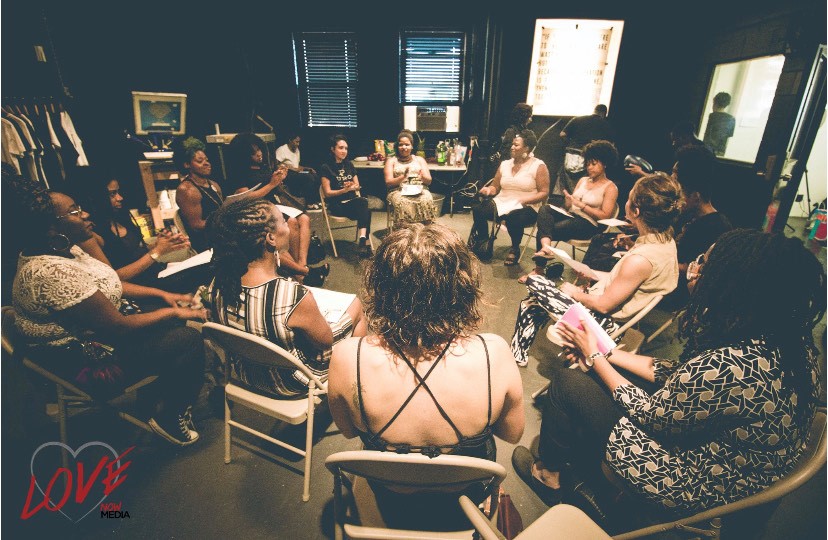By Jos Duncan
As diversity, equity, and inclusion initiatives increase along with demands for newsrooms to dismantle and repair long standing racist practices that have caused damage to B+IPOC for centuries, I’m working to create equitable work through Love Now Media, a Philadelphia based media company that uplifts the voices of those advocating for justice, wellness, and equity. I define equity as sharing and distributing power, information, resources, and access. As the founder of a Black, woman, LGBT+ led media organization, I am committed to equitable practices that might be modeled by other newsrooms. And when philanthropists are deciding what stories and organizations they strategically support, I think it is important for them to understand and consider the diversity of paths, perspectives and entry points into the world of news and media making.
For a long time, I hesitated to call myself a journalist. I felt that my work as a storyteller and cultural producer existed on the fringes of news. In fact, for many years, my work as a storyteller was a response to the negative impact ‘the news’ had on Black communities. In an effort to capture narratives that reflect a more multidimensional view of Black communities and Black culture, I was drawn to filming it - and NOT as a journalist but as part of the community. One of my very first community stories, in 2004, was about a young lady named Tikel Johnson who returned home from a tour in the Army. On her first day home, the 21-year-old called together 6 young Black men in the housing complex where her elderly aunt lived, and they all worked together to paint and renovate the woman’s apartment. As a short documentary, none of us had ever seen a story like this about a 21 year old Black woman leading this type of an endeavor. Nor had we seen stories depicting Black boys joyfully, spackling, painting, sweating, and freestyle rapping all while providing for a beloved elder woman. For me, documenting the story revealed a new kind of power. In a community where so many news stories only highlighted poverty, violence, and hardship, this story not only showed audiences a new and inspiring narrative about young Black boys in North Philly, but it marked a moment in history and reflected an image of the young people that they, themselves were empowered by. These are the stories that have motivated me as a storyteller.
My personal inquiry was: How might I find, frame, and document stories that represented timely, relevant issues in a balanced way through my cultural lens as a Black woman? Through years of study, an advanced degree in Media and Communications, classes in journalism and workshops with the Poynter Institute, I dipped my toes in the water of journalism.
The concept of “gaze” informs my approach to storytelling. In feminist theory, the male gaze is the act of depicting women in the world, often through a white, masculine, heterosexual perspective. While objectivity is essential to traditional journalism, my foundational roots in filmmaking keep me aware of my presence, whether with pen and paper or a camera, and how that impacts the story. For example, if I, as a Black woman, walk into a room with 100 white men talking, my presence will likely impact what they say and it also changes the truth of the moment. The story I look for and the way that I tell it will be significantly different from the way a white male journalist would tell the story. Conversely, as a Black woman, telling stories about #BlackLivesMatter, Black advocacy, and justice for Black communities will likely be significantly different from the way a white male journalist would tell the story. I would argue that the notion of objectivity in journalism is itself rooted in a white male privilege, and thus a bias. Having the cultural fluency of BIPOC storytellers is essential in framing and contextualizing stories. Rather than being dismissed for a lack of objectivity, it should be embraced as a strength. And, this work, which today is referred to as service journalism, engagement journalism or movement journalism, should be integrated into the work of newsmaking as it is what makes journalism culturally competent and equitable.
As a media leader working at the intersection of community storytelling, news, and documentary film, I believe in diverse voices. I believe in qualifying experts based on lived experiences, I believe in listening deeply to those who contribute to the design of a process or system. I want to be clear that does not mean silencing those who are experienced journalists or experts but rather qualifying people who have traditionally been left in the margins to create with those who are experts. As an equitable practice, I believe in cultivating skills in my team members as opposed to just hiring folks with certain skill sets. I like to test things. I’ve found that having people try or lead new work in new areas invigorates people while simultaneously adding diversity to the team. This also gives everyone the opportunity to develop, play, discover, and imagine.
As we begin to envision what the future of media will look like following the pandemic, we have to be willing to throw away ideas that never really did serve us. Together, we must be willing to uproot elitist practices that are a disservice to BIPOC communities and media makers of color. We have to be willing to fold folks who share mission and values into positions of power and processes, pay them well, and empower storytellers and the people whose stories are being told with narratives that better represent their full humanity.
Jos Duncan is the founder of Love Now Media, an empathy-centered media company that uses storytelling to advocate for social justice and wellness, now. She was a keynote speaker at our 2020 SPARX Conference, Justice: From Moment to Movement.


